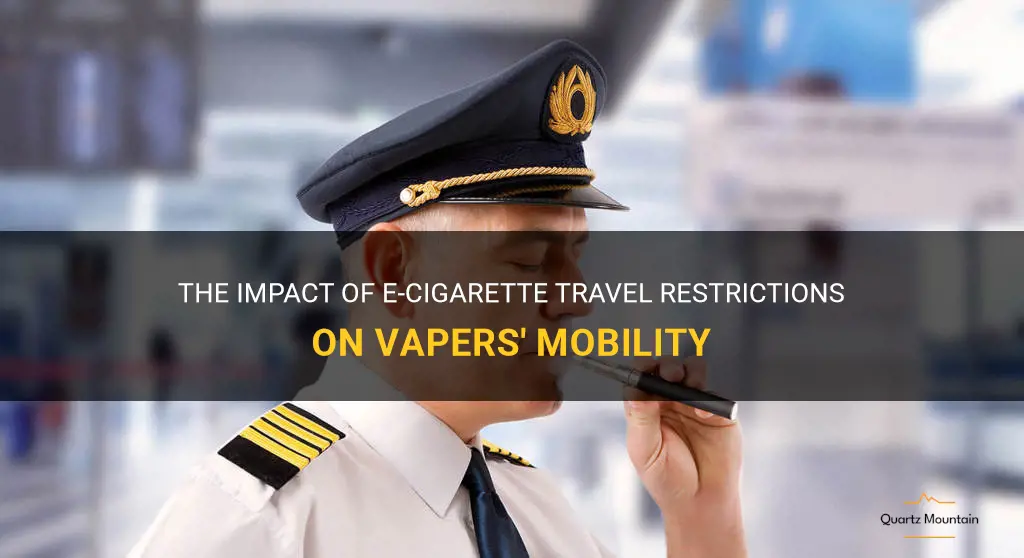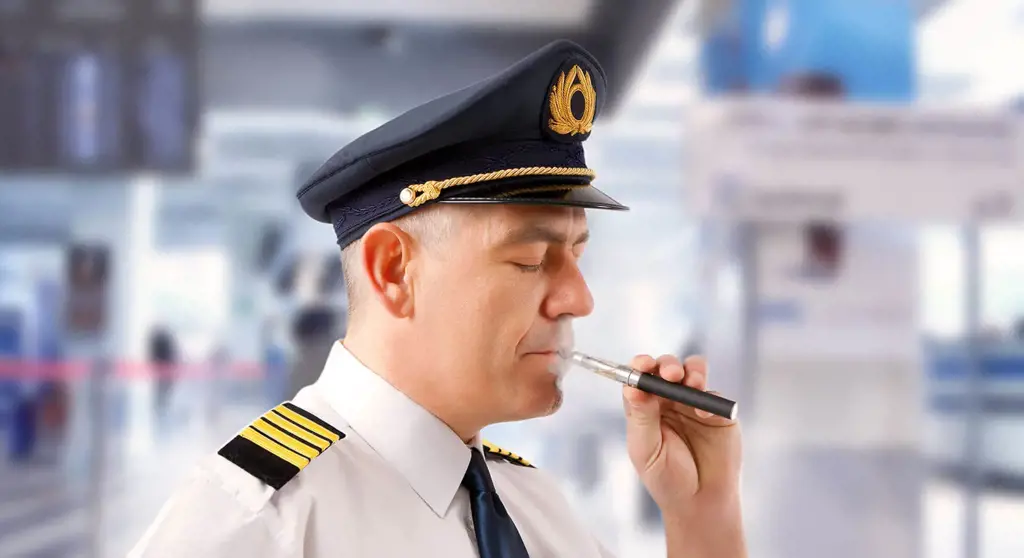
As more and more people turn to e-cigarettes as a healthier alternative to traditional smoking, it's important to understand the regulations and restrictions that govern their use while traveling. E-cigarette travel restrictions can vary greatly from country to country, with some nations embracing these devices while others outright ban them. In this article, we'll explore the fascinating world of e-cigarette travel restrictions, shedding light on the different approaches taken by governments around the globe. Whether you're a seasoned traveler or planning your first trip abroad, understanding these regulations will help ensure a smooth and hassle-free journey for all e-cigarette enthusiasts.
What You'll Learn
- What are the current travel restrictions for e-cigarettes?
- Are there specific countries that prohibit the use or possession of e-cigarettes while traveling?
- Can I pack e-cigarette devices and e-liquids in my carry-on luggage?
- Are there any restrictions on using e-cigarettes in airports or on airplanes?
- Is it necessary to declare e-cigarettes at customs when traveling internationally?

What are the current travel restrictions for e-cigarettes?

As e-cigarettes continue to grow in popularity, it is important for travelers to stay informed about the current travel restrictions regarding these devices. While e-cigarettes are generally permitted in most locations, there are some restrictions and guidelines to keep in mind when traveling.
One of the main factors that determine whether e-cigarettes are allowed in a particular location is the local legislation and regulations regarding vaping. Some countries and regions have banned e-cigarettes completely, while others have implemented restrictions on where they can be used.
For example, several countries such as Brazil, Singapore, and Thailand have banned the sale, import, and use of e-cigarettes. In these places, travelers should be aware that bringing e-cigarettes can result in confiscation, fines, or even jail time. It is essential to research and understand the specific regulations of your destination before bringing e-cigarettes.
In many countries where e-cigarettes are allowed, there are still restrictions on their use. For instance, some airports and airlines have implemented rules that prohibit the use of e-cigarettes in the airplane cabin. Instead, passengers are required to store e-cigarettes in their carry-on luggage or checked baggage for the duration of the flight. It is important to check with the specific airline you are traveling with to determine their policy on e-cigarette usage.
Additionally, it's worth noting that some countries have imposed restrictions on the amount of e-liquid that can be brought into the country. It is advisable to check the local regulations regarding the maximum quantity and packaging requirements for e-liquids.
When it comes to traveling with e-cigarettes, it is always recommended to store them safely to avoid any accidents or damage. It is best to keep e-cigarettes in a protective case and remove any batteries if possible. This reduces the risk of accidental activation during travel.
Another essential consideration when traveling with e-cigarettes is to pack spare coils, batteries, and e-liquids in your carry-on luggage. This ensures that you have access to these necessary items during your trip, even if your checked baggage is delayed or lost.
To stay up to date on the latest travel restrictions for e-cigarettes, it is recommended to check with the embassy or consulate of your destination country. They can provide you with the most accurate and current information regarding the regulations and guidelines related to e-cigarettes.
In conclusion, while e-cigarettes are generally allowed in many places, it is crucial to be aware of the specific travel restrictions in your destination. Familiarize yourself with local laws, regulations, and guidelines to ensure a smooth and hassle-free travel experience with your e-cigarettes. Remember to always prioritize safety and follow the rules set by airlines, airports, and local authorities.
Unpacking the Restrictions: What You Need to Know About Amtrak's Travel Item Policies
You may want to see also

Are there specific countries that prohibit the use or possession of e-cigarettes while traveling?

When it comes to e-cigarettes, also known as vaping devices, the regulations and restrictions surrounding their use can vary from country to country. While some countries may have lenient laws and allow the use and possession of e-cigarettes, others have implemented strict regulations or even outright bans. It is important for travelers to be aware of these regulations before bringing e-cigarettes with them on their journeys to avoid any legal consequences.
One country that has taken a strong stance against e-cigarettes is Singapore. The use, sale, and importation of e-cigarettes are completely banned in the country. Those found in possession of e-cigarettes can face hefty fines or even imprisonment. Additionally, e-cigarette users may also be subjected to random enforcement checks and can be fined for possession even if they are found to have used the device outside of Singapore.
Similar regulations can be found in other countries as well. In Thailand, the use of e-cigarettes is illegal, and violators may face fines or imprisonment. The same can be said of countries like Brunei, Cambodia, and the Philippines, where the sale and possession of e-cigarettes are prohibited.
While e-cigarettes may be legal in some countries, it is crucial to respect local laws and regulations. For example, in Australia, the sale and possession of nicotine-containing e-cigarettes without a prescription are illegal. However, the use and possession of nicotine-free e-cigarettes are generally allowed in most states.
The European Union (EU) also has regulations governing e-cigarettes. The sale and use of e-cigarettes with nicotine are legal in most EU member states; however, some countries have imposed stricter regulations. For instance, in Belgium and Luxembourg, the sale and possession of nicotine-containing e-cigarettes are banned. In contrast, neighboring countries like the Netherlands and Germany allow their use and sale.
It is important to note that regulations can change, and it is advisable to check the latest information before traveling. The best way to ensure compliance is to research the specific laws and regulations of the destination country and, when in doubt, to err on the side of caution by refraining from using or carrying e-cigarettes.
To summarize, while e-cigarettes are legal in some countries, others have strict regulations or bans in place. Travelers should be aware of the laws surrounding e-cigarettes in their destination country and respect them to avoid any legal issues. Checking the latest information and researching the local regulations is recommended before traveling.
Understanding the Current Travel Restrictions to Greece: What You Need to Know
You may want to see also

Can I pack e-cigarette devices and e-liquids in my carry-on luggage?

As electronic cigarettes, commonly known as e-cigarettes, have gained popularity, many people are wondering whether they can bring their e-cigarette devices and e-liquids on a plane in their carry-on luggage. The answer to this question depends on the airline and the country you are flying from and to.
In general, most airlines allow passengers to bring e-cigarette devices on board, but there are some restrictions and guidelines that need to be followed. Let's take a closer look at the rules and regulations for carrying e-cigarette devices and e-liquids in your carry-on luggage.
Firstly, it's important to note that e-cigarette devices are not allowed in checked baggage due to safety concerns. Lithium-ion batteries, which are commonly used in e-cigarettes, can be a fire hazard if they are damaged or short-circuited. Therefore, it is always recommended to pack your e-cigarette devices in your carry-on baggage where they can be easily accessed and monitored.
When it comes to e-liquids, the rules may vary. In most cases, the Transportation Security Administration (TSA) allows passengers to bring e-liquid bottles in their carry-on luggage, as long as they comply with the liquid restrictions set by the TSA. These restrictions include packing your e-liquids in containers of 3.4 ounces (100 milliliters) or less and placing them in a clear, quart-sized plastic bag. Each passenger is limited to one quart-sized bag of liquids.
It's important to check the specific regulations of the airline and country you are flying with, as they may have additional restrictions or guidelines in place. Some countries may completely ban the use or possession of e-cigarettes, so it's crucial to do your research before traveling.
To ensure a smooth and hassle-free experience at the airport, here are a few tips to keep in mind:
- Pack your e-cigarette devices and e-liquids in your carry-on baggage.
- Place your e-liquids in containers of 3.4 ounces (100 milliliters) or less and pack them in a clear, quart-sized plastic bag.
- Check the specific regulations of the airline and country you are flying with.
- Always keep your e-cigarette devices and batteries in a protective case to prevent any damage or short-circuiting.
- Turn off your e-cigarette devices and remove the batteries before boarding the plane.
- Inform the security officers about your e-cigarette devices and e-liquids when going through the security screening.
In conclusion, in most cases, passengers are allowed to bring their e-cigarette devices and e-liquids in their carry-on luggage. However, it's important to follow the rules and regulations set by the airline and country you are flying with to ensure a hassle-free travel experience. Always check with the TSA and the specific airline for the most up-to-date information and guidelines.
Navigating the Latest Dominican Republic Travel Restrictions: What You Need to Know
You may want to see also

Are there any restrictions on using e-cigarettes in airports or on airplanes?

In recent years, electronic cigarettes, or e-cigarettes, have gained popularity as an alternative to traditional tobacco cigarettes. E-cigarettes use a battery-powered heating element to vaporize a liquid solution containing nicotine. While e-cigarettes are generally seen as a less harmful alternative to smoking, there are still some restrictions on their use, particularly in airports and on airplanes.
In most airports, the use of e-cigarettes is treated the same as traditional cigarettes. This means that smoking or vaping in designated non-smoking areas is not allowed. Many airports have dedicated smoking areas where both traditional cigarettes and e-cigarettes are permitted, but it is important to check the specific rules of the airport you are traveling through. Some airports have banned smoking altogether, including e-cigarettes.
When it comes to airplanes, the use of e-cigarettes is strictly prohibited. The Federal Aviation Administration (FAA) has classified e-cigarettes as an "electronic smoking device" and has banned their use on all commercial flights. This ban includes both using e-cigarettes in the cabin and storing them in checked or carry-on baggage.
The main reason for the ban on e-cigarettes on airplanes is the potential for the lithium-ion batteries used in the devices to catch fire. There have been several incidents of e-cigarettes overheating or catching fire in recent years, both on airplanes and in other settings. The FAA has determined that the risk of fire caused by e-cigarettes is too great to allow their use on airplanes.
It is worth noting that some airlines have their own specific policies regarding e-cigarettes. While the FAA ban applies to all airlines operating in the United States, individual airlines may have additional restrictions in place. Some airlines may ban the use of e-cigarettes on all flights, even if they are not prohibited by the FAA. It is important to check with your airline before traveling to ensure that you are aware of their specific policies.
In conclusion, there are restrictions on using e-cigarettes in airports and on airplanes. While some airports do have designated smoking areas where e-cigarettes are permitted, others have banned smoking altogether. The FAA has banned the use of e-cigarettes on all commercial flights due to the risk of fire caused by the devices. It is important to check the rules of the airport and airline you are traveling with to ensure that you are in compliance with their specific policies.
Discover the Caribbean: Explore These Breathtaking Destinations with No Travel Restrictions
You may want to see also

Is it necessary to declare e-cigarettes at customs when traveling internationally?

When traveling internationally, it's important to be aware of customs and regulations regarding the items you bring with you. For those who use e-cigarettes, it's natural to wonder if they need to be declared at customs. The answer to this question can vary depending on the country you are traveling to and their specific laws and regulations.
In general, it is recommended to declare your e-cigarettes when going through customs. This is because some countries have restrictions or outright bans on the importation of e-cigarettes and related products. By declaring your e-cigarettes, you can avoid potential issues and penalties for trying to bring in prohibited items.
In some cases, you may also need to provide documentation or proof of purchase for your e-cigarettes. This can help customs officials determine the value and legality of the items you are bringing with you. It's a good idea to keep the original packaging or receipts for your e-cigarette and any related accessories, as they may be requested by customs officials.
It's worth noting that even if e-cigarettes are allowed in the country you are traveling to, there may still be restrictions on where you can use them. Some countries have banned the use of e-cigarettes in certain public places or in specific areas, so it's important to familiarize yourself with the local laws and regulations before using your e-cigarette.
To ensure a smooth experience when going through customs with your e-cigarettes, it's recommended to do some research in advance. Check the customs website or contact the embassy or consulate of the country you are traveling to for specific information on e-cigarette regulations. By knowing and following the rules, you can avoid any unnecessary complications during your trip.
In summary, it is generally advisable to declare your e-cigarettes when traveling internationally. Each country has its own regulations regarding e-cigarettes, so it's important to research and understand the rules before you travel. By declaring your e-cigarettes and following any necessary procedures, you can ensure a hassle-free experience at customs.
Navigating Liquid Restrictions for Domestic Travel in Australia
You may want to see also
Frequently asked questions
Yes, there are restrictions when it comes to bringing e-cigarettes on an airplane. The Federal Aviation Administration (FAA) prohibits e-cigarettes and vaping devices in checked baggage. However, passengers are allowed to bring these devices in their carry-on bags and use them during the flight, as long as they follow the airline's specific guidelines.
The regulations regarding taking e-cigarettes on international flights can vary depending on the destination country. Some countries might have strict rules and consider e-cigarettes illegal altogether, while others might allow them for personal use. It is important to research and familiarize yourself with the specific regulations of the country you are traveling to before bringing your e-cigarette.
Yes, there can be restrictions on using e-cigarettes in public places while traveling, especially in countries or regions where vaping is heavily regulated or banned. Many countries have implemented laws that prohibit vaping in public spaces, similar to regulations for traditional tobacco products. It is advisable to check the local laws and regulations regarding e-cigarette use in public places before using them while traveling.







